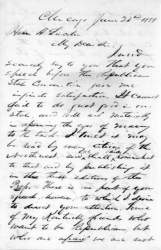Record Data
Transcription
Chicago June 22nd 1858
My Dear Sir,
I need scarcely say to you that your speech before the Republican State Convention gave me infinite satisfaction. It cannot fail to do great good in our state, and will aid materially in opening the eyes of many to the truth. I trust it may be read by every citizen of the North west, and we shall aid somewhat to that end by publishing it in the three editions of the Press. There is one part of your speech, however, to which I desire to direct your attention. Some of my Kentucky friends who want to be Republicans, but who are afraid we are not sufficiently conservative, who are also somewhat afraid of our name, but who hate "Locofocoism" most cordially, have objected to the following on the ground of its "ultraism":
[ Attached Clipping:
I believe this Government cannot endure, permanently, half slave and half free.
I do not expect the Union to be dissolved-- I don't expect the house to fall -- but I do expect it will cease to be divided. It will become all one thing, or all the other.
Either the opponents of slavery will arrest the further spread of it, and place it where the public mind shall rest in the belief that it is in course of ultimate extinction; or its advocates will push it forward till it shall become alike lawful in all the States, old as well as new -- North as well as South.]
This they hold is an implied pledge on behalf of the Republican s party to make war upon the institution in the States where it now exists. They do not perceive that you refer to the a moral tendency, but insist that your meaning goes to a political warfar under legal forms against slavery in the States. Nor will they admit that your meaning is limited by the declaration of principles adopted by the Convention before the delivery of your speech. "The declaration", they say "is right, but the speech, in this one particular, is'nt."
I call your attention to the fact, not with the expectation that you will make public explanations. That I do not believe would be advisable. But I take the liberty to suggest that on some subsequent occasion, it may be advisable for you to state your views specifically relative to the general question of federal interference with slavery in the states, and also as to the policy of the Republican party, as a National political organization, meddling with the subject any further than Congress has the constitutional right of controlling it.
Very Truly Your friend
Jno. L. Scripps







